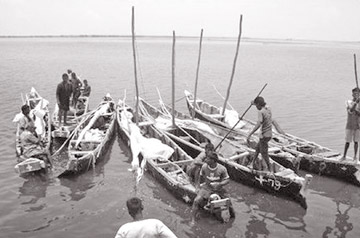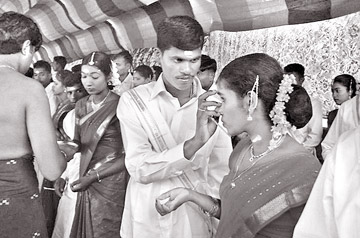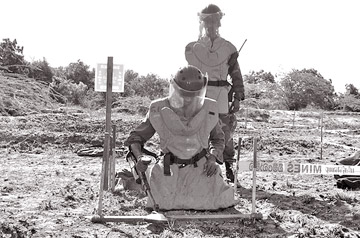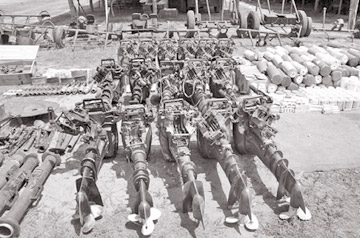|
National Security Concerns - 2:
Terrorism, extremism and communalism- a threat to a country
By Gotabaya Rajapaksa
 |
| Fishing has
resumed with the removal of restrictions |
 |
| Some
rehabilitated former LTTE cadre get married |
There are several potential threats in today’s context that Sri Lanka
needs to be concerned about. These include:
The possible re-emergence of terrorism
The emergence of other extremist groups
The creation of ethnic divisions and communal violence
The challenges of maritime security and border control
The growth of organised crime
Foreign interference in domestic affairs
Non-traditional threats through technology - driven new media, including
social media.
In discussing terrorism, it is first of all important to appreciate
the sheer scale of the problem that the Government of Sri Lanka was
confronted with as a result of the LTTE over the past three decades.
Since the 1970s, the LTTE grew from a small organisation of armed
individuals to a large, sophisticated terrorist outfit with very
advanced combat capabilities.
At its height, the LTTE had more than 30,000 battle-hardened cadre;
access to large stockpiles of modern armaments, ammunition and
equipment; a sophisticated naval wing and a fledgling air wing. For a
considerable period of the conflict, the LTTE wa s able to maintain the
illusion of a functional state apparatus in the territories it
dominated.
It also had significant influence in foreign capitals as a result of
its extensive international network. Defeating the LTTE required a
concerted effort on the part of the Sri Lankan Government. As a result
of the unwavering leadership of President Mahinda Rajapaksa, this task
was achieved in May of 2009.
Number of issues
In the immediate aftermath of the war against terrorism, there were a
number of issues that needed to be dealt with. First was the problem of
nearly 300,000 displaced people who had been used as the LTTE’s human
shield during the last phases of the battle. Then there was the need to
demine the North and the East so that those areas would be safe for
human habitation. This resulted in the recovery of hundreds of thousands
of mines and improvised explosive devices laid by the LTTE during its
retreat. Infrastructure development and reconstruction of those areas
after years of neglect under the LTTE’s dominance was another
significant issue that had to be dealt with, after which it was possible
to resettle the displaced in their places of origin. One of the most
important issues was dealing with the nearly 12,000 surrendered LTTE
cadre and four thousand detained cadre.
The Government took the bold step of rehabilitating nearly all of
them so that they could become productive citizens in future. The vast
majority of them have already been reintegrated with society.

Demining for unexploded devices

Some of the LTTE arms and ammunition recovered by the Forces |
Among other post-war achievements has been the disarming of other
armed groups that used to operate in the North and the East, and the
encouragement these groups have been given to contribute to society
through democratic processes. The restrictions that used to be in force
on movement, fishing and high security zones have all been removed.
Democracy has been completely restored, with free and fair elections
taking place. Economic growth in the North and the East has been truly
remarkable in the recent past, and it is clear beyond doubt that
normalcy has been restored to the people.
Despite all of these very positive developments, however, the threat
of terrorism re-emerging still persists. One of the main reasons for the
LTTE’s success during its heyday was its extensive international
network, which has been in operation for many decades.
Following the ambush and massacre of 13 soldiers in the North by the
LTTE in 1983, there was a major communal backlash against the Tamils in
the rest of the country. As a result of the July 1983 riots, a large
number of Tamil people left Sri Lanka and travelled to countries such as
Canada, the United Kingdom, Malaysia and parts of Europe. These
countries granted asylum to these immigrants, and later granted them
citizenship. As such, there is a large population of immigrant Sri
Lankan Tamils in other countries.
Small minority
A small minority of this population supports the LTTE even to this
day. Extremist elements within this community, together with LTTE agents
and operatives, including trained terrorists who fled Sri Lanka at
various times during terrorism, comprise the LTTE’s international
network.
After the demise of Prabhakaran, the LTTE’s former procurement chief
Kumaran Pathmanadan, better known as KP, took control over this network
and indicated that it would continue to work for the separatist cause
through peaceful means. However, a breakaway faction emerged almost
immediately, led by Nediyawan, who wanted to continue Prabhakaran’s
ideology of violence.
Nediyawan’s group, was previously known as The Tamil Eelam People’s
Assembly or the Tamil National Council and is now known as the Tamil
Coordinating Committee. Based in Norway, this group has been working
with other international groups to promote the LTTE’s separatist cause
in many parts of the world. The Tamil Coordinating Committee has control
over most of the assets of the LTTE’s international organisation,
including its media networks such as TamilNet.
Following the arrest of KP in August 2009, Rudrakumaran took over the
leadership of the main network and began working towards establishing a
“Government in Exile”. This group now fashions itself as The
Transnational Government of Tamil Eelam. In the guise of fighting for
Tamil rights, its primary objective is to lobby foreign governments for
the establishment of a separate state in the North and the East of Sri
Lanka.
Advisory committee
The so-called “Transnational Government” has about 20 “Ministers” and
“Deputy Ministers”, and was formed with assistance of an advisory
committee comprising prominent pro-LTTE activists, including foreigners
who have been helping the LTTE for many years. There has recently been a
revolt within the TGTE, where one third of its members loyal to
Nediyawan, went against the leadership of Rudrakumaran because they
wished to engage in more radical action.
Another prominent LTTE-linked group emerged out of the British Tamils
Association (BTA), which was active since 2001 in supporting the
terrorism of the LTTE in Sri Lanka. In 2006, the leader of the BTA,
Arunachalam Krishanthakumar, alias Shanthan, was investigated on
suspicion of supporting terrorist activities. As a result of these
suspicions about the BTA, the British Tamils Forum (BTF) was formed in
2006 to carry on the same activities in a new guise. The BTF acted as an
umbrella organisation that mustered support from the immigrant Tamil
community and local British politicians for dividing Sri Lanka. With
Shanthan’s arrest by British authorities in June 2007 for providing
material support to terrorism and his conviction in April 2009, as well
as the defeat of the LTTE in May 2009, the role played by the BTF needed
to be changed to suit the post-war environment. As a result of this, the
Global Tamils Forum (GTF) emerged in February 2010, with many of the
same members as the BTF. The head of the GTF is the so-called Father
Emmanuel, a Priest who was once hailed by Prabhakaran as “a freedom
fighter who has given leadership to a movement committed to setting up
the homeland to Tamil Eelam”.
Propaganda campaign
Father Emmanuel has been engaged in a propaganda campaign against Sri
Lanka for many years, targeting Tamil expatriates, foreign governments
and international organisations. He is known to have visited LTTE
strongholds in Sri Lanka in mid-2000 to conduct training for selected
youth who were earmarked to take up overseas appointments for
fundraising and propaganda for the LTTE.
Under Father Emmanuel’s guidance, the GTF has successfully influenced
a number of politicians from various political parties in European
countries as well as the United States, Australia, Canada and India to
support the separatist cause. In addition, the GTF has courted officials
within international organisations such as the United Nations, the
European Union and various international non-governmental organisations
to obtain their support. Part of the success of the GTF in these
activities can be attributed to the involvement of influential pro-LTTE
foreigners in it. These include Mrs. Joan Ryan, a former British
Parliamentarian who has become the Head of the GTF’s Secretariat.
Yet another group that is active internationally in supporting the
separatist cause is the LTTE Headquarter Group, which is based in France
and headed by Vinayagam, a senior intelligence cadre who managed to
escape during the final stages of the war against terrorism in Sri
Lanka. This is a group that is known to engage in human smuggling, with
some of its past operations including the sending of the “Sun Sea” and
“Ocean Lady” vessels from South East Asia to Canada in 2009 and 2010.
The members of this group generally maintain a low profile and their
movements are kept to a minimum as most of them have been issued red
notices by Interpol for their involvement in criminal activities. They
also keep their distance from both Nediyawan’s and Rudrakumaran’s
groups, but maintain links with the GTF.
Overarching objective
All of the LTTE-linked groups are coordinated by the GTF and united
by one overarching objective. Their unwavering intent is the division of
Sri Lanka and the establishment of a separate state for Tamil Eelam.
There are several strategies through which they will try to achieve
their objective. These include:
The winning of international opinion for the separatist cause,
Increasing international pressure on Sri Lanka in various areas;
including pushing for international investigations into war crimes and
claims of genocide, and by encouraging international monitoring of the
national reconciliation process,
Undermining all efforts of the democratically elected Government of
Sri Lanka to create a better future for its citizens through
reconciliation and economic development, and
Continuing to push for the resumption of conflict through
reorganizing local pro-LTTE elements within Sri Lanka.
Some of the efforts of these LTTE-linked groups have been successful
to a certain extent in that despite the war against terrorism having
ended four years ago, the internal affairs of Sri Lanka have been kept
at the forefront of the UNHRC’s Sessions as well as at the top of the
agenda of several prominent international NGOs even in the recent past.
It has to be noted that many of those who create this pressure by
claiming to be human rights activists and victims of state repression
are actually trained LTTE cadre and operatives who are now fully engaged
in propaganda activities. It is very important to understand that their
attempts to put pressure on the Government through international bodies
such as the UNHRC and non- state actors such as international NGOs is
designed to strengthen those who work against Sri Lanka’s interests.
In this context it is important to realise that there are groups even
within the democratic mainstream in Sri Lanka that obtain funding from
the LTTE’s international network and pro-LTTE elements overseas, which
more or less openly talk about achieving the very same objectives that
the LTTE had. Though they appear to have a democratic face, their
actions and remarks clearly show that the extremist separatist ideology
has not yet disappeared. Their ultimate objective is achieving the
division of Sri Lanka. As a result of their actions and statements, it
is very much a possibility that certain radical elements will feel
empowered to once again attempt to take up arms in the name of
separation. This is a major National Security threat that needs to be
taken with the utmost seriousness.
In addition to the threat of terrorism, Sri Lanka also faces a
potential threat from other extremist groups. These are the remnants of
the radical groups that were involved in previous insurgencies. Some of
these groups are trying to reorganise within Sri Lanka and mobilise
people to once again take up their extreme left wing causes.
There is information that some of these groups have started to link
with the LTTE-linked groups to create further problems in Sri Lanka.
Some of their activities include radicalising students and encouraging
them to take to the streets in various protests. Though such activities
are still in their early stages, they pose another serious National
Security concern that we need to be vigilant of.
Growing concern
Another growing concern in the post-war environment is the increasing
communalism amongst ethnic groups, which if left unaddressed, could
result in the rise of ethnic tensions in the future. During the period
of terrorism, it was not only the Sinhalese and Tamil communities that
were affected by the terrorist separatism of the LTTE, but also the
Muslims. After the LTTE started engaging in ethnic cleansing in the
North in the early 1980s, it expelled the Sinhalese community from
Jaffna and soon after turned its attention on the Muslims. Several
massacres were carried out at mosques in the East, and in October 1990,
the LTTE expelled more than 75,000 Muslim residents from the North. This
was followed by further brutal attacks on Muslims in vulnerable villages
near the territory dominated by the LTTE.
In this environment, the Muslims also started to organise themselves
for their own protection against the LTTE. After the LTTE’s defeat, some
of these groups have begun to engage in activities that stem far beyond
self-protection. There is some information that some of these groups
have even tried to link with the global Islamic terrorist movement. This
is a situation that requires careful monitoring.
On a broader scale, it also has to be acknowledged that one of the
consequences of the terrorist conflict Sri Lanka endured for 30 years
has been the increased insularity of ethnic groups. Rather than
identifying themselves on the basis of nationality, the communities of
Sri Lanka have begun to identify themselves on the basis of their
ethnicity or their religion. Instead of calling themselves Sri Lankan,
they identify themselves as Sinhalese or Tamils or Muslims or Buddhists
or Christians.
This fragmentation of the Sri Lankan identity is most unfortunate,
because activists within these communal groups seek minority rights or
ethnic rights rather than working within the framework of a common
national identity.
The cross-border links that can arise as a result of such insular
ethnic or religious identification is also very troublesome. It is clear
that there are some in the Tamil community who identify themselves more
with the Tamil community of Tamil Nadu than with their fellow Sri
Lankans. This has been encouraged by some parties overseas who wish to
promote the idea of a greater Tamil Nation. Similarly, it has been
observed that there are some foreign groups that wish to encourage Sri
Lankan Muslims to identify themselves more with the global Muslim
community, thereby reducing their integration within Sri Lanka. This
trend has been particularly prevalent in the post-September 11 world, in
which there has been a tendency among certain groups to try and
influence the global Muslim community towards religious extremism has
become visible.
The increasing insularity and cohesion amongst minority ethnic groups
has also led to the emergence of hard-line groups from the majority
community: the popularity of certain political groups and movements can
be viewed as being largely a response to this trend. In turn, the
emergence of hard-line groups in the majority community causes further
tensions amongst other communities, which leads to a vicious cycle of
greater fragmentation of the Sri Lankan identity. Sri Lanka had enough
divisions in the past that ultimately led to conflict; we must learn the
lessons from our past and ensure that history is not repeated. This is
therefore a very serious National Security concern at the present
moment.
A lecture on the National Interest Module of the inaugural MPhil/PhD
Programme of the Kotelawala Defence University by Defence Secretary
Gotabaya Rajapaksa.
To be continued |


